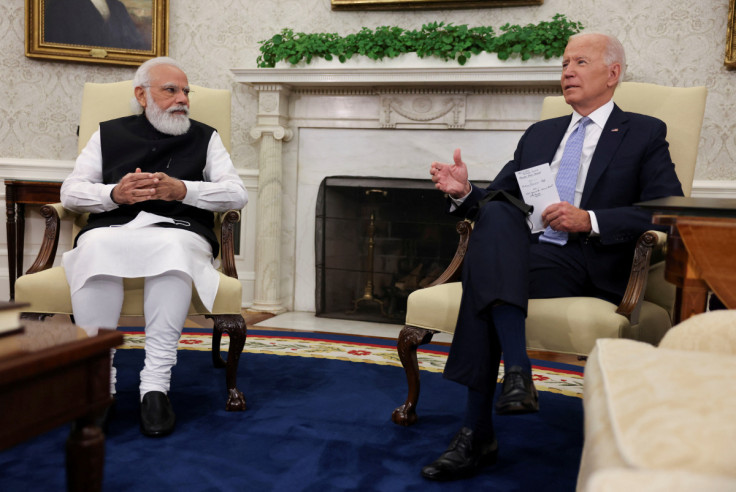India Invites Joe Biden As Chief Guest For 2024 Republic Day Celebrations

KEY POINTS
- Washington's envoy to India, Eric Garcetti, said Biden was formally invited by Modi during their last bilateral discussion
- Garcetti did not confirm whether Biden will attend the Republic Day festivities in January
- An invitation as the chief guest for the event is seen as an honor reserved for the country's closest allies and partners
President Joe Biden has been invited by Prime Minister Narendra Modi to attend India's 2024 Republic Day parade, marking the close-knit ties between the two nations.
Washington's envoy to India, Eric Garcetti, confirmed Wednesday that Biden was formally invited by Modi to be the chief guest at the Republic Day festivities on Jan. 26, 2024. Modi extended the invitation during his bilateral discussion with Biden on the sidelines of the G20 summit earlier this month.
Garcetti did not confirm whether Biden would attend the Republic Day celebration.
India is also slated to host the upcoming Quad summit, consisting of India, the U.S., Japan and Australia, around the same time.
"During their bilateral talks on the sidelines of the G20 summit, Prime Minister Modi invited President Biden to visit for Jan. 26. He did not mention the Quad Summit during the meeting, as that has to be coordinated between [all four countries]," Garcetti told reporters at an event hosted by think tank Ananta Aspen Centre.
An invitation as the chief guest for India's Republic Day celebration is seen as an honor reserved for the country's closest allies and partners. Egyptian President Abdel Fattah el-Sisi was the chief guest in 2023, while former President Barack Obama attended the event as Modi's chief guest in 2015.
The invitation to Biden could be an outcome of the expanding India-U.S. strategic partnership, which includes close cooperation in defense, building resilient strategic technology value chains and collaboration on renewable and nuclear energy.
Modi, who was denied a visa to the U.S. due to his alleged role in anti-Muslim violence before he became India's prime minister, was welcomed with pomp and fanfare during his visit to Washington in June. Biden even called his country's relationship with India one of the most defining ties of the 21st century.
One of the main pillars of the India-U.S. strategic partnership is their defense ties, and both sides are now accelerating their joint efforts in defense technology cooperation and co-production.
"The India-U.S. defense industrial cooperation between Prime Minister Narendra Modi and U.S. President Joe Biden held in June and the second meeting between the two leaders on Sept. 8 depicted the significance of technology in strengthening bilateral relationships with strategic partner countries. India stands to gain ground in the field of diversification in defense acquisitions, which traditionally has been relying on Russia largely. India can also benefit from the West in gaining the latest technologies and weapon systems," Shayesta Nishat Ahmed, a research analyst at the Manohar Parrikar Institute for Defence Studies and Analyses (MP-IDSA), New Delhi, told International Business Times.
"The push toward 'Make in India' through partnerships and production can, in turn, create a defense ecosystem with corresponding gains to the economy through the generation of employment opportunities and technological development," she added. "This can also contribute toward the civil arena."
For the U.S., the relationship with India is also important to promote Washington's Indo-Pacific strategy.
"To strengthen bilateral ties and protect U.S. interests in the Indo-Pacific, the U.S. National Defense Strategy (NDS) for 2022 has named India as a key partner," Ahmed said. "The Biden administration is aware of India's importance in containing China's aggressive behavior in the Indian Ocean region in order to preserve the freedom and openness of the economic sea lines of communication (SLOCs). Regular low-intensity skirmishes between China and India along the Line of Actual Control, and India's involvement in economic and geopolitical cooperative endeavors like the QUAD further portray India's significance for the U.S."
In addition to common security concerns, India and the U.S. also share concerns on other areas such as terrorism, cyber, space, energy supply and climate change, she added.
© Copyright IBTimes 2024. All rights reserved.






















